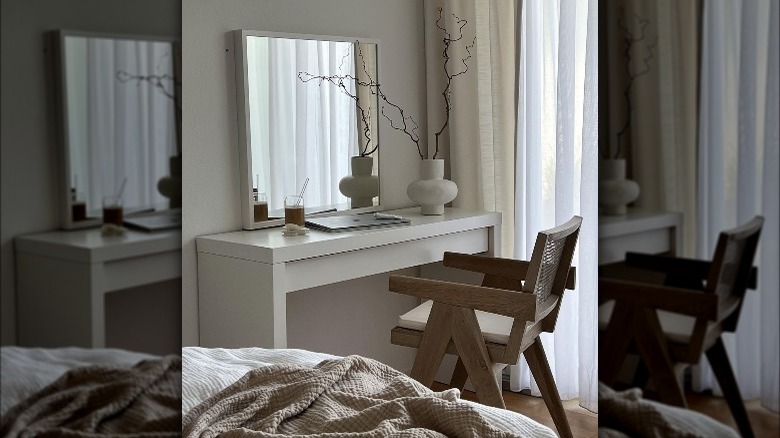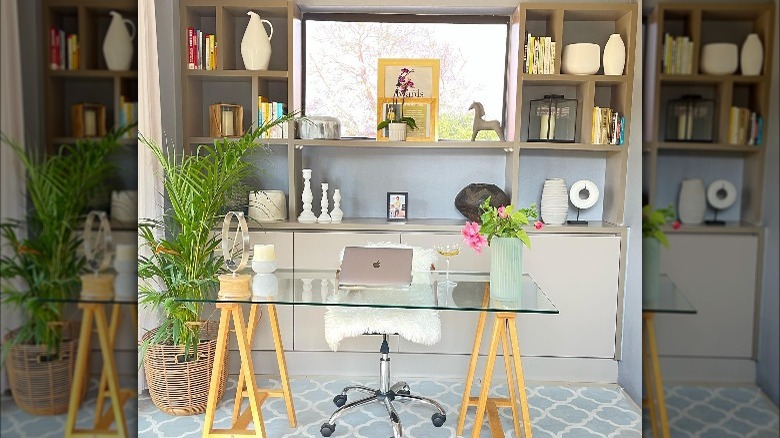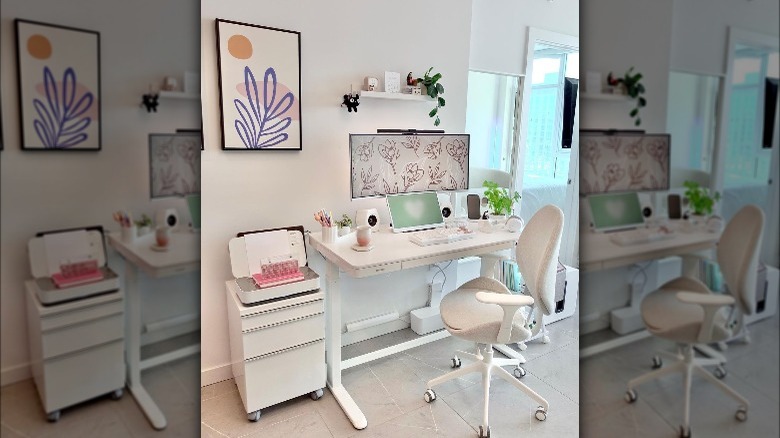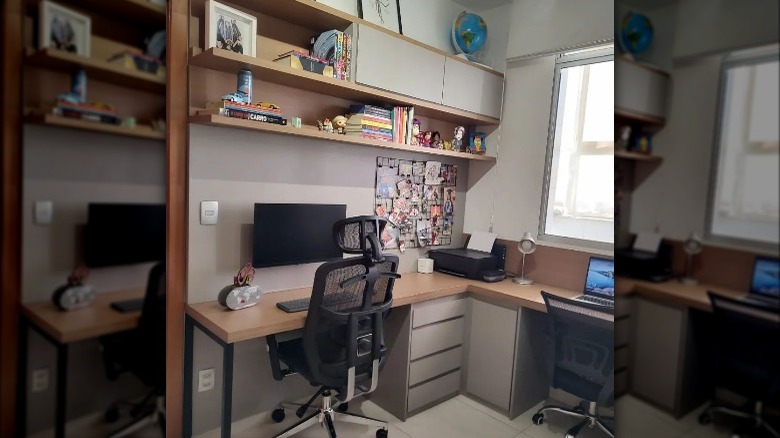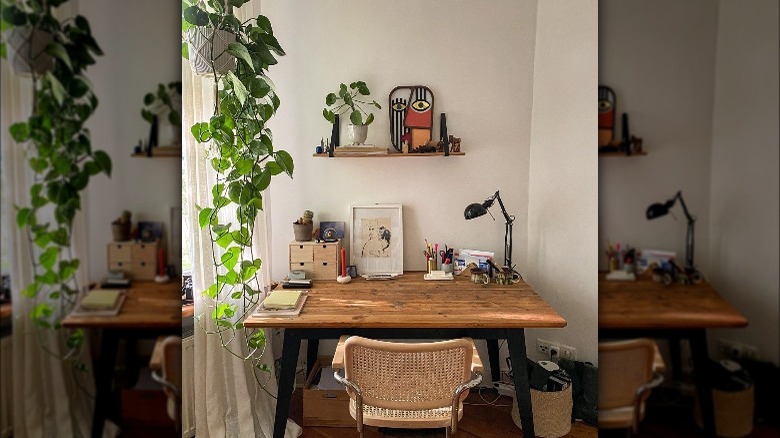Restored By The Fords Star Leanne Ford's Quick Tips For Creating A Successful Home Office
Prior to the pandemic just over two years ago, remote work opportunities were few and far between. Not so much anymore. In fact, the number of work-from-home employees tripled between 2019 and 2021, according to the United States Census Bureau. Though many people have returned to the office, that jump has sustained itself, with states like Washington, Maryland, Colorado, and Massachusetts representing the highest percentage of home-based workers.
Whether you work telecommute full-time or a few days a week, a home office has become essential. But even if you still drive to work, they provide the perfect environment to manage bills, taxes, and other household finances.
If you want a well-functioning den, experts recommend approaching it strategically. Leanne Ford of HGTV's "Restored by the Fords" knows how to create spaces that function without sacrificing style. Indeed, a workspace that's both efficient and comfortable is essential to getting work done. Ford shares her tips with Goop for a home office you'll love to work in.
Hide the guest bed
Did you have a home office before 2020? If not, the spare guest room was likely the most logical choice at the time. And while this configuration can work, it's not ideal. "Let's face it: You aren't having guests over any time soon," Ford tells Goop. "If you're lucky enough to have an extra room in the house, use it." Having a dedicated office space is preferable, as you won't have any hangups about using it. But this setup isn't always possible if your home can't accommodate visitors and an office.
"If you can't actually move the bed out, consider pushing it to a side wall in order to help your office space take over energetically," Ford continues. "I did this with my first house, which had two bedrooms. I put in a communal table desk and hung a curtain between it and the guest bed on the side. It made a world of difference — we felt as if we had a proper office."
Then again, if a certain room must serve dual purposes, opt to add a sleeper or pull-out sofa, suggests Raymour & Flanigan. This will provide some comfortable seating while you work, but also convert to a bed whenever you host guests.
Desk positioning
Of course, a desk is the most important piece of any home office. After choosing the right style, positioning should also be a top consideration. "To feel more productive, orient your desk to face the door into the room," Ford suggests, per Goop. "You'll be less inclined to look behind you." Not only that, but this also provides an opportunity to see who's coming and going throughout your home (via Plank & Pillow). A desk in the center of the room is also ideal for conducting meetings.
"If that's not possible, face [it] toward a favorite window with a view," Ford continued. "It might slow down productivity a little, but it will surely make you feel better than staring at a blank wall." A view out the window can also make the space feel less constricting, especially when putting in long hours. Still, other experts recommend facing your desk toward a wall, as it can promote better focus and keep you on task longer, says The Nature Hero. Ultimately, desk placement is all about what works best for the room's layout and your productivity.
A space that inspires
Nobody wants to work in a room they hate. But one benefit of having a home office is the ability to design and decorate it as you see fit. "It's important to create a space that inspires work, but is also easy to separate yourself from at the end of the day," Ford says, via Goop. "The kitchen table isn't ideal in terms of quality of life." Not only do you want a space that's conducive to work, but you also want as much of a dedicated area as possible.
Even if you can't use an entire room, you still have options. "Is there an extra nook at the end of a hallway you might take over?" Ford said. "Is there a closet you could temporarily clear out and put a desk in? It's great to be able to literally close the door when work is over."
Indeed, having a dedicated productivity space is essential for proper work-life balance, enabling you to be free of distractions and more productive, according to Half Travel. However, when closing your laptop, it won't feel like — or at least it shouldn't — you're still in the office. That's why you should also consider using your workspace strictly during work hours.
Clean and unclutter often
After finishing work for the day, it's only natural to want to rush out and enjoy your evening. But Ford cautions against that. "Each night before you wrap up work, tidy up so you are inspired to get back to work the next day," she tells Goop. After all, no one wants to return to a messy work environment or spend the first few minutes of their workday cleaning up the mess from last night. Cleaning up before leaving the office allows you to start your next day fresh.
That could mean employing various organizational practices and storage methods. "Admittedly, I have a few drawers that are filled with stuff, so my desktop feels clean and serene," Ford says. "As long as you have a place to put things, it doesn't have to be perfect. But a clean desk does help you feel more ready to get working and more drawn to sit down at your desk. Keep the least amount possible on your desk. The clearer it is, the clearer you can think!" Supplies like cups, jars, files, and tray organizers are a great way to organize common office supplies, suggest Organized Living, and help free up your workspace.
Treat your office like going to work
Sure, one appeal of working from home allows for a more lax dress code, but that doesn't mean you should wear sweatpants every day. You also shouldn't make a habit of rolling out of bed minutes before the workday begins. "Get up, get your coffee, put real clothes on, and get to work," Ford says to Goop.
Now, this doesn't mean only putting on proper attire for meetings. Instead, looking professional can put you in a proper working mindset, rather than a laid-back mentality when wearing sweatpants. It's also an opportunity to experiment with your personal style and express yourself, according to The Everygirl.
Routine is also important when working remotely, and part of that is training your brain to make associations. "Try not to work from the sofa, and definitely don't work from your bed!" Ford warns. "This will help create some normalcy." Working at your desk or another home office space will put you in work mode and allow you to be more productive.

